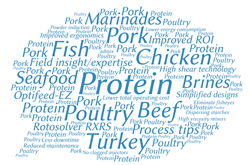Mixing Your Way to Better Yields and Less Line Downtime – Our Meat & Poultry Blog Series
Process Improvement Tip – Water Quality

Hard water can severely hamper certain brine / marinade ingredient’s ability to completely dissolve or hydrate. This has a large impact on yield causing purge, weeping and in severe cases, clogged injector needles.
Hard water is formed when water percolates through deposits of limestone and chalk which are largely made up of calcium and magnesium carbonates. It is the presence of calcium ions and magnesium ions in the water that makes it hard. Typically, when water is lab-tested, the analysis report provides a number to describe the hardness. However, the USGS has developed a standard that gives us a better number based on the fact that it is the precise mixture of minerals dissolved in the water, together with the water’s pH balance and temperature that determine the behavior of the hardness. Using this method gives us a ppm (parts per million) reading as follows:
| Classification | Hardness in PPM | Comment |
| Soft Water | less than 60 | Great water for all uses |
| Moderately Hard Water | 61 – 120 | Consult with your ingredient suppliers (especially phosphate) to ensure compatibility |
| Hard Water | 121 – 180 | Yields likely being affected by 1-3% |
| Very Hard Water | > 181 | Severe yield impacts |


 Jesper Sæderup Lindeløv, Managing Director
Jesper Sæderup Lindeløv, Managing Director Knud Erik Juhl Jensen, General Manager, Admix Europe ApS
Knud Erik Juhl Jensen, General Manager, Admix Europe ApS
 Patrick Lakin, Director of Sales and Marketing
Patrick Lakin, Director of Sales and Marketing Kara Martakos, Human Resources Director
Kara Martakos, Human Resources Director Keith Cheries, Director of Sales Operations
Keith Cheries, Director of Sales Operations Eric Therriault, Vice President of Engineering
Eric Therriault, Vice President of Engineering Bob Trottier, Vice President of Operations
Bob Trottier, Vice President of Operations Dan Cameron, Chief Financial Officer
Dan Cameron, Chief Financial Officer Mike Rizzo, Chief Executive Officer
Mike Rizzo, Chief Executive Officer